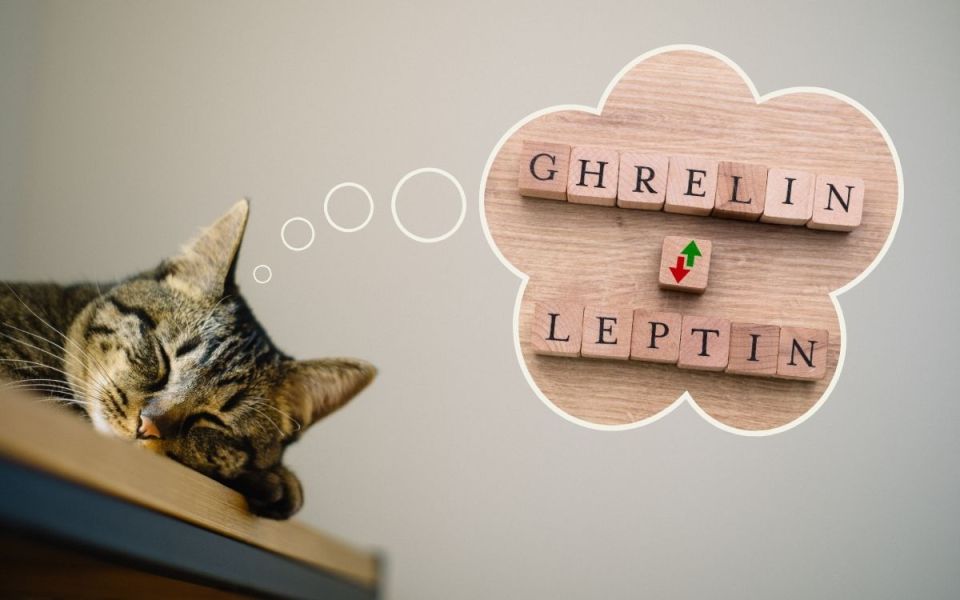Cat Naps and Calories: Uncovering the Link Between Sleep and Weight

Sleep is like a pet cat. Mysterious, time-consuming, and necessary for life. Sleep keeps our brain and body stable. Without sleep we get groggy, sloppy, angry, headachy, and about as fun to be around as a cat in the shower. Sleep is so necessary that when mice are severely sleep-deprived, dangerous molecules build up in the gut and can kill them. But that’s… that’s weird, right? Without sleep, the gut gets messed up? Actually, the link between sleep and the gut is stronger than most people realize.
Chronic sleep deprivation of fewer than 7 hours a night can lead to an increased chance of obesity in humans. Behavioral and social influences are at play here when you don’t sleep: you have more time to eat, sleep deprivation increases stress (and stress eating), and when you’re tired it’s harder to exercise. There is also a lot of biochemistry at play here. Research scientists have discovered a pair of hormones in the body - leptin and ghrelin - that get out of balance in sleep-deprived individuals. Let’s paw through these molecules to see how this may affect obesity.
Leptin is a fairly small protein that helps keep us thin. The name “leptin” is derived from the Greek word leptos, meaning - appropriately - “thin.” Leptin is released from fat cells (called adipose cells) and circulates throughout the body and brain. Around the body, leptin affects immune function, bone metabolism, our resting metabolic rate - which affects how much energy we use, and insulin sensitivity - which affects how we digest sugars. In the brain, high levels of leptin inhibit our appetite and make us feel full. Normally, as we gain weight the fat cells release more leptin to help us regulate our body mass by wanting less food. Sleep is an integral part of this process; the system breaks down without it.
Sleep directly affects how much leptin is circulating in our system. With healthy sleep, the body produces and releases leptin at night. Research shows that leptin levels peak between midnight and the early morning, then gradually decrease throughout the day. Additionally, sleep deprivation suppresses leptin production, resulting in overall lower levels and reduced feelings of fullness and satiety throughout the day. Studies have found that any sleep helps increase leptin levels - even catnaps in the middle of the day.
If leptin is a calm older cat, ghrelin is a crazy kitten. Ghrelin was discovered in 1999 as the primary activator of growth hormone receptors and named after the root word ghre, which means “to grow.” And its job is to make us grow. Most ghrelin is released from the stomach and keeps us from accidentally starving to death. Ghrelin levels increase when we are fasting and are stimulated when we see, smell, or taste food.
Inside the body, ghrelin is the polar opposite of leptin. It increases blood glucose, inhibits insulin secretion, and convinces the gut to start moving. In the brain, ghrelin increases our appetite. Typically, ghrelin levels are higher in food-deprived people and lower in obese people. Sleep plays a big role with ghrelin, too. Ghrelin levels increase when we are sleep deprived, increasing our hunger and making us more prone to store calories as fat instead of using them in exercise.
Zooming out a little, sleep deprivation has a clear impact on our hunger. It makes sense for the short term: when we’re tired, leptin drops and ghrelin increases, causing us to seek out energy in the form of food. Even more, after we eat, we tend to get sleepy, which helps restore the sleep we lost. The real problem is with chronic, long-lasting sleep deprivation. Researchers have found that people who sleep one fewer hour per day are around 3 pounds heavier than their peers. When people chronically sleep fewer than 5 hours a day, the likelihood of obesity increases by 40%. The exact cause and effect here get a little muddy, as obesity is also linked to sleep disorders, and those with obesity may have abnormal leptin and ghrelin levels. One thing is clear, though, sleep deprivation claws away at the normal leptin and ghrelin systems. So next time you’re feeling a little pudgy, just act like my cats and sleep for 20 hours a day.
Staff Writer / Editor Benton Lowey-Ball, BS, BFA
Click Below for ENCORE Research Group's Enrolling Studies
References:
Cooper, C. B., Neufeld, E. V., Dolezal, B. A., & Martin, J. L. (2018). Sleep deprivation and obesity in adults: a brief narrative review. BMJ open sport & exercise medicine, 4(1), e000392. https://doi.org/10.1136/bmjsem-2018-000392
Mantzoros, C. S., Magkos, F., Brinkoetter, M., Sienkiewicz, E., Dardeno, T. A., Kim, S. Y., ... & Koniaris, A. (2011). Leptin in human physiology and pathophysiology. American Journal of Physiology-Endocrinology and Metabolism, 301(4), E567-E584. https://journals.physiology.org/doi/full/10.1152/ajpendo.00315.2011
Müller, T. D., Nogueiras, R., Andermann, M. L., Andrews, Z. B., Anker, S. D., Argente, J., ... & Tschöp, M. H. (2015). Ghrelin. Molecular metabolism, 4(6), 437-460. https://www.sciencedirect.com/science/article/pii/S2212877815000605
Sato, T., Nakamura, Y., Shiimura, Y., Ohgusu, H., Kangawa, K., & Kojima, M. (2012). Structure, regulation and function of ghrelin. The Journal of Biochemistry, 151(2), 119-128. https://academic.oup.com/jb/article/151/2/119/2182660
Siegel, J. M. (2008). Do all animals sleep?. Trends in neurosciences, 31(4), 208-213. https://www.ncbi.nlm.nih.gov/pmc/articles/PMC8765194/
Spiegel, K., Leproult, R., L’Hermite-Balériaux, M., Copinschi, G., Penev, P. D., & Van Cauter, E. (2004). Leptin levels are dependent on sleep duration: relationships with sympathovagal balance, carbohydrate regulation, cortisol, and thyrotropin. The Journal of clinical endocrinology & metabolism, 89(11), 5762-5771. https://academic.oup.com/jcem/article/89/11/5762/2844744
Vaccaro, A., Dor, Y. K., Nambara, K., Pollina, E. A., Lin, C., Greenberg, M. E., & Rogulja, D. (2020). Sleep loss can cause death through accumulation of reactive oxygen species in the gut. Cell, 181(6), 1307-1328. https://www.cell.com/cell/fulltext/S0092-8674(20)30555-9
Wada, N., Hirako, S., Takenoya, F., Kageyama, H., Okabe, M., & Shioda, S. (2014). Leptin and its receptors. Journal of chemical neuroanatomy, 61, 191-199. https://www.sciencedirect.com/science/article/abs/pii/S0891061814000878


